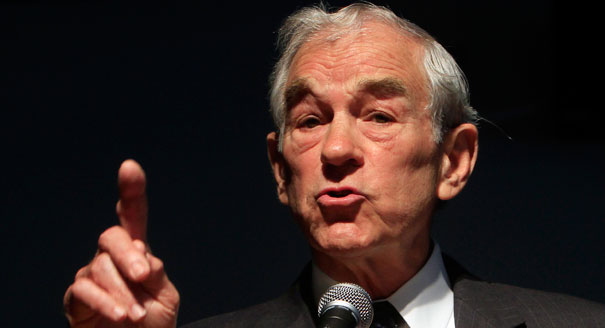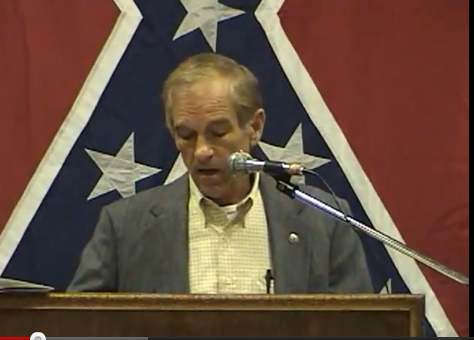Solidarity Political Committee
February 2, 2012
Congressman Ron Paul (R-TX) is not the typical politician. He says what he thinks and lets the chips fall where they may. He’s against the war in Afghanistan and against any U.S. invasion of Iran. He points out that U.S. policy in the Middle East “has only intensified strife and conflict” and “U.S. tax dollars have militarized the entire region.”
Paul was one of the few congresspeople to vote against the PATRIOT Act. He’s also against NAFTA and the World Trade Organization. Paul claims never to have taken government-paid junkets or voted to increase the power of the executive branch. In his weekly columns and on his web site he talks about how much federal legislation favors the wealthy.
Paul ran for president on the Libertarian Party line in 1988 and is running in the Republican primaries in 2012. A number of younger Republicans and independents able to crossover and vote in the Republican primaries see him as a “principled politician.” Should working people, antiwar activists and those struggling for social justice vote for Ron Paul? We think that would be a big mistake.

Like many other Libertarians, Ron Paul does not believe in government regulation. It’s his view there is no need for government to “level the playing field” and protect vulnerable individuals or groups. For example, he says a person who owns a business should be “free” to run it. If an individual agrees to work for an employer, regardless of the terms, Paul considers this is a private matter needing no governmental “interference.” Therefore he opposes minimum wages, voted zero funding of OSHA’s ergonomics rules and voted No on restricting an employer from interfering in union organizing. He is for right-to-work (for less) legislation. He does not believe there should be laws holding an employer accountable for a violation of civil rights or sexual harassment at the work site.
In Freedom Under Siege, Paul discussed sexual harassment at the workplace and remarked:
“Employee rights are said to be valid when employers pressure employees into sexual activity. Why don’t they quit once the so-called harassment starts? Obviously the morals of the harasser cannot be defended, but how can the harassee escape some responsibility for the problem? Seeking protection under civil rights legislation is hardly acceptable.” (24)
If an employee has a problem with the employer or his management team, he or she is “free” to quit and find another job. This individualistic and abstract vision does not reflect the reality of working people’s lives: a job with a living wage and benefits doesn’t just grow on trees – it’s something you want to keep and make better.
But for Ron Paul it’s the right of the owner to “control property and run his or her business as he or she chooses.” Of course Paul does cover himself by saying, “If force was clearly used, that’s another story, but pressure and submission is hardly an example of a violation of one’s employment rights.” Ron Paul indicates that he’s oblivious to the dynamics of power and control in the workplace or in the larger society, or is a master at covering them up with his rhetoric.
Thus Paul portrays racism as a simple case of what he calls “bigotry.” This is a “problem of the heart, and we cannot change people’s hearts by passing more laws and regulations.” But racism is not equivalent to what is in people’s hearts; it is also the institutional structures that perpetuate racial inequality. He feels free to say the Civil Rights Act violates the Constitution because it impedes individual liberties and he votes against renewing the Voting Rights Act.
Congressman Paul cannot even see how the current system provides some children with excellent education and other children — inner city African Americans and Latinos, Native Americans whether in rural or urban areas — education that perpetuates their feelings of inferiority. For him, “taxes, restrictive regulations, corporate subsidies, racial set-asides, and welfare programs” are the ways “the government plays far too large a role in determining who succeeds and who fails.” This is just the “polite” version of the myth of Black mother as the “welfare queen.”
Sometimes his hatred for African Americans is out in the open. In analyzing the LA riots at the time of Rodney King’s beating, he wrote: “The criminals who terrorize our cities—in riots and on every non-riot day—are not exclusively young black males, but they largely are. As children, they are trained to hate whites, to believe that white oppression is responsible for all black ills, to “fight the power,” and to steal and loot as much money from the white enemy as possible.” (“Los Angeles Racial Terrorism,” Ron Paul Political Report) He also remarked that “Order was only restore in L.A. when it came time for the blacks to pick up their welfare checks three days after rioting began.”
Although now Paul says he did not read his own newsletters, he did not disavow them at the time. In fact, these newsletters earned Ron Paul almost one million dollars a year.
In essence Ron Paul fits the portrait of a rightwing libertarian populist. He’s right wing on a number of social issues because he believes people should make individual decisions to remove themselves from positions where they are victimized, without realizing the power dynamics at play. He defends the right of workers to self-organize but balances that with the employers’ right to harass and intimidate those who try to organize a union. He tells people who need medical care but don’t have coverage to look for charitable institutions to help them.
If he’s good at exposing much of the way legislation is written to aid the wealthy, Ron Paul perpetuates myths as well. He claims that the social security system “is broke and broken” and opposes giving benefits “to anyone who has not paid into the system.” By that he means undocumented workers — actually they pay into the system but are rarely able to collect. Most frequently those who receive benefits but didn’t contribute are the young, the widowed, and the disabled. But the idea behind social security is that the pool of funds is large enough to take care of those who are the most vulnerable.
Despite Ron Paul’s comments, and all kinds of other rightwing propaganda, the social security system is not in a crisis. As one of the few mechanisms that bind together the different generations, it remains an efficient symbol of social solidarity. Yet Paul has nothing positive to say about it; instead he undermines it by calling on younger workers to be able “to save and invest” on their own. Realistically, few can.
In general Ron Paul’s libertarian creed is one of less governance. There are, however, exceptions to that yardstick:
- In the area of reproductive freedom, Paul, who is an OB/GYN doctor, sees the right of the unborn “at the heart of the American ideals of liberty” and who has been the prime sponsor of HR 300, which would “negate the effect of Roe v Wade by removing the ability of federal courts to interfere with state legislation to protect life.”
- Although he voted against using government funds for the victims of Katrina, he has won billions in special projects for his own congressional district.
- In the area of immigration “reform,” Paul puts forth a six-point plan: militarize the borders and coastlines, track visa holders and deport all who overstay or violate U.S. law, refuse all requests for amnesty, deny any undocumented access to hospitals, clinics, schools, roads and any social services, end the constitutional right of citizenship to those born in the country and pass “true immigration reform” that would apply the same rules and waiting periods across the board.
Instead of understanding that the passage of NAFTA and other corporate globalization policies have undercut the ability of Mexicans and Central Americans to sustain themselves and their families, and thus given rise to a new wave of migration to the United States, instead of understanding that U.S. foreign policy in the Middle East has forced millions from their homes, Ron Paul proposes to “solve” a social problem Washington has created by militarizing the borders. If one understands the problem, the solution is absurd.
Paul was the first presidential candidate to cross the picket line of striking Hollywood writers so that he could appear on ABC’s “The View.” He follows the “free market” economics of Ludwig von Mises and Milton Friedman, supports “states rights” over federal legislation around workers health and safety, challenges evolutionary theory with discredited “creationism,” and, despite his position on militarizing the borders, claims to support civil liberties. He receives prominent billing on rightwing websites that perpetuate conspiracy theories based on ethnicity and was a co-sponsor of the Marriage Protection Act.
Just like a stopped clock, Ron Paul tells time correctly a couple of times a day. As a mainstream politician, he may be refreshing and occasionally on target. But he does not have a political program that is able to solve the war of inequality we face at home and the violent war Washington is perpetuating abroad.
Instead of narrow-minded solutions to today’s problems, we need to look for candidates with forward-looking answers. We certainly won’t find them within parties that are controlled by the corporate elite. So the candidates of the Democratic and Republican parties talk about “change,” but notice how little substance there is.

